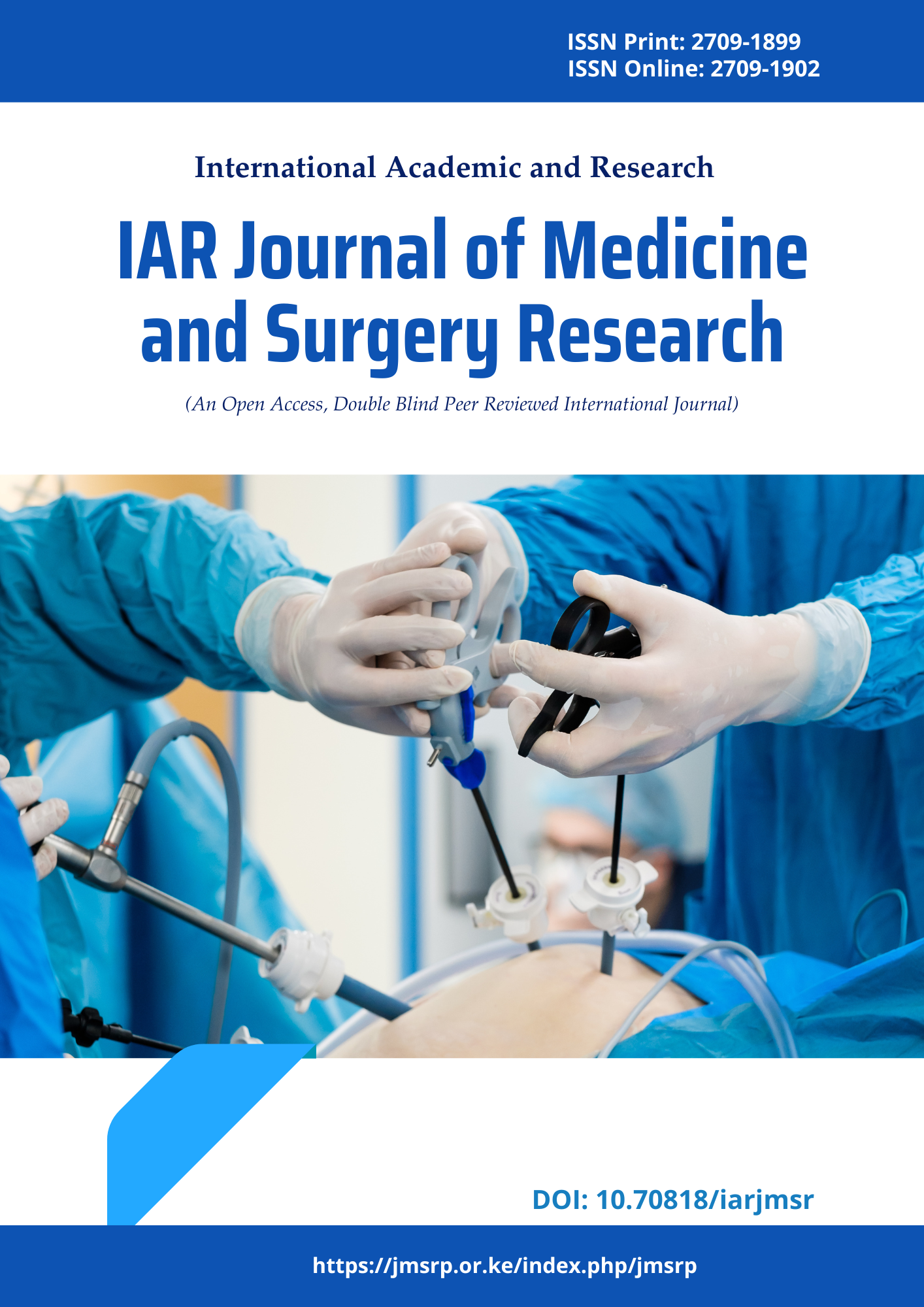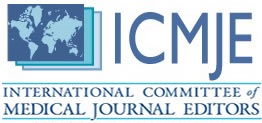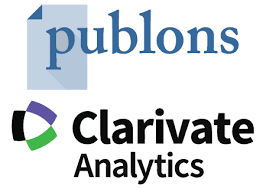Maternal risk factors and family burden with cleft children in Bangladesh
DOI:
https://doi.org/10.70818/iarjmsr.2024.v05i05.0131Keywords:
Bangladesh, Cleft lip, Cleft palate, Family burden, Cleft childAbstract
Background: Congenital anomalies like cleft lip and palate are defects that are visible at birth and can be fatal. The family burden of cleft children is high in the world. Methods: This cross-sectional study included 110 cleft children (case) aged three months to 15 years. Data was collected through face-to-face interviews from parents or caregivers attended the Department of Oral and Maxillofacial Surgery of Dhaka Dental College and Update Dental College in Dhaka, Bangladesh. Results: This study included 58 (52.7%) males and 52 (47.3%) females cleft children. About 62 (56.4%) cases were <1 year old and the birth weight of 70 (63.6%) child was <2.5 kg. Fifteen (13.6%) mothers of them had a previous history of birth abnormalities with cleft children. Twenty-four (21.8%) mothers were malnourished during pregnancy. The mean caregiver burden score was 42.40; most were mothers, whereas 7 (43.8%) had no burden, followed by mild to moderate burden 13 (44.8%). Notably, 24 (36.9%) caregivers experienced moderate to severe burden levels with an age range of 30 to 40 years. Education up to HSC level and middle socio-economic status were found statistically significant for the birth of a cleft child (p<0.05). Conclusion: These findings highlighted the significant impact on family burden and caregiver's well-being.
References
Paranaíba LM, Miranda RT, Ribeiro LA, Barros LM, Martelli-Júnior H. Frequência de malformações congênitas craniofaciais em um Centro de Referência Brasileiro. Revista Brasileira de Epidemiologia. 2011;14:151-60. doi.org/10.1590/S1415-790X2011000100014
Dixon MJ, Marazita ML, Beaty TH, Murray JC. Cleft lip and palate: understanding genetic and environmental influences. Nature Reviews Genetics. 2011 Mar;12(3):167-78. doi.org/10.1038/nrg2933
de Souza Freitas JA, das NEVES LT, de ALMEIDA AL, Garib DG, Trindade-Suedam IK, Yaedú RY, Lauris RD, Soares S, Oliveira TM, Pinto JH. Rehabilitative treatment of cleft lip and palate: experience of the Hospital for Rehabilitation of Craniofacial Anomalies/USP (HRAC/USP)-Part 1: overall aspects. Journal of Applied Oral Science. 2012 Feb 1;20(1):9-15. doi:10.1590/S1678-77572012000100003
Trettene AD, Mondini CC, Marques IL. Feeding children in the immediate perioperative period after palatoplasty: a comparison between techniques using a cup and a spoon. Revista da Escola de Enfermagem da USP. 2013 Dec 1;47:1298-304. doi.org/10.1590/S0080-623420130000600007
Trettene AD, Razera AP, Maximiano TD, Luiz AG, Dalben GD, Gomide MR. Doubts of caregivers of children with cleft lip and palate on postoperative care after cheiloplasty and palatoplasty. Revista da Escola de Enfermagem da USP. 2014;48:993-8. doi.org/10.1590/S0080-623420140000700005
Raina P, O'Donnell M, Rosenbaum P, Brehaut J, Walter SD, Russell D, Swinton M, Zhu B, Wood E. The health and well-being of caregivers of children with cerebral palsy. Pediatrics. 2005 Jun 1;115(6):e626-36. doi.org/10.1542/peds.2004-1689
Manoel MF, Teston EF, Waidman MA, Decesaro MD, Marcon SS. As relações familiares e o nível de sobrecarga do cuidador famliar. Escola Anna Nery. 2013;17:346-53. doi.org/10.1590/S1414-81452013000200020
Cardoso L, Vieira MV, Ricci MA, Mazza RS. Perspectivas atuais sobre a sobrecarga do cuidador em saúde mental. Revista da Escola de Enfermagem da USP. 2012;46:513-7. doi.org/10.1590/S0080-62342012000200033
Scazufca M. Versão brasileira da escala Burden Interview para avaliação de sobrecarga em cuidadores de indivíduos com doenças mentais. Brazilian Journal of Psychiatry. 2002;24:12-7. doi.org/10.1590/S1516-44462002000100006
Zarit SH, Edwards AB. Family caregiving: research and clinical intervention. Handbook of the clinical psychology of ageing. 1996:331-68. DOI:10.1002/9780470773185
Solano NE, Linares MA, López J, Fox M, Sarmientos L, Álvarez B. A retrospective study of the epidemiological characteristics of patients with orofacial clefts: Craniofacial anomalies unit of the University Hospital of Maracaibo. Journal of Cleft Lip Palate and Craniofacial Anomalies. 2020 Jul 1;7(2):108-13. DOI: 10.4103/jclpca.jclpca_26_19
Impellizzeri A, Giannantoni I, Polimeni A, Barbato E, Galluccio G. Epidemiological characteristic of Orofacial clefts and its associated congenital anomalies: retrospective study. BMC Oral Health. 2019 Dec;19:1-4. doi.org/10.1186/s12903-019-0980-5
Razera AP, Trettene AD, Tabaquim MD, Niquerito AV. Study of burden among caregivers of children with cleft lip and palate. Paidéia (Ribeirão Preto). 2017;27(68):247-54. doi.org/10.1590/1982-43272768201701
Sjamsudin E, Maifara D. Epidemiology and characteristics of cleft lip and palate and the influence of consanguinity and socioeconomic in West Java, Indonesia: a five-year retrospective study. International Journal of Oral and Maxillofacial Surgery. 2017 Mar 1;46:69. doi.org/10.1016/j.ijom.2017.02.251
Kishimba RS, Mpembeni R, Mghamba J. Factors associated with major structural birth defects among newborns delivered at Muhimbili National Hospital and Municipal Hospitals in Dar Es Salaam, Tanzania 2011–2012. Pan African Medical Journal. 2015;20(1). DOI:10.11604/pamj.2015.20.153.4492
Cymrot M, Sales FD, Teixeira FD, Teixeira Junior FD, Teixeira GS, Cunha Filho JF, Oliveira ND. Prevalência dos tipos de fissura em pacientes com fissuras labiopalatinas atendidos em um Hospital Pediátrico do Nordeste brasileiro. Revista Brasileira de Cirurgia Plástica. 2010;25:648-51. doi.org/10.1590/S1983-51752010000400015
Palandi BB, Guedes ZC. Aspectos da fala de indivíduos com fissura palatina e labial, corrigida em diferentes idades. Revista CEFAC. 2011;13:8-16. doi.org/10.1590/S1516-18462011005000012
Allam E. Cleft lip and palate: etiology, epidemiology, preventive and intervention strategies. Anatomy and Physiology. 2014;4(3):1. DOI:10.4172/2161-0940.1000150
Gbolahan OO, Amiede OS, Samuel OA. The burden and perceived stress on family caregivers of patients with orofacial cleft deformities in the perioperative period of cleft repair. Journal of Patient Experience. 2020 Dec;7(6):1602-9. doi.org/10.1177/2374373520948650
Kobos E, Imiela J. Factors affecting the level of burden of caregivers of children with type 1 diabetes. Applied Nursing Research. 2015 May 1;28(2):142-9. doi.org/10.1016/j.apnr.2014.09.008.
Downloads
Published
Issue
Section
License
Copyright (c) 2024 Latifa Howlader, Tanzima Yeasmin, Gias Uddin (Author)

This work is licensed under a Creative Commons Attribution 4.0 International License.















